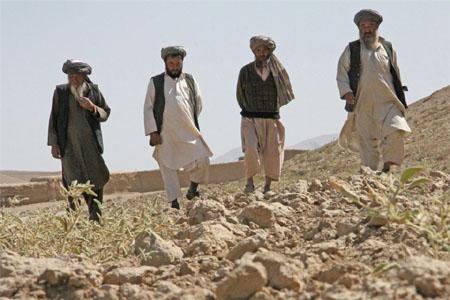Northern Afghanistan has been experiencing drought-like conditions in recent months which have hit crops, livestock and the livelihoods of farmers and their families. Two farmers from Khoram Sar Bagh District in Samangan Province told IRIN they feared they would soon have nothing to eat, and were so desperate that they had begun selling their livestock.
Livestock farmer Mohammad Israyel, 48

Farmers in Samangan Province – close to three million people are facing food shortages. (Photo: Mohammad Popal/IRIN)
“I had 50 sheep, four cows and two donkeys. We have all lost our crops and I have sold 22 of my sheep since the drought began. You can’t imagine how difficult it is to sell your sheep. It’s like selling your children. I feel the pain, but I had no option.
“I needed the money to buy animal food for my cows and donkeys and the rest of the sheep. My cows and donkeys are so important. My donkeys help me bring drinking water from a very far place because we don’t have drinking water in our area, and my cows give us the milk that is our only means of survival.
“I sent my two older sons to Iran last month. They went there illegally and I am still waiting to hear from them. And I’m not the only one. There are hardly any boys or men here aged 16-40. I blame the government as much as the drought - there are no jobs.
“Some of my livestock might survive till winter but I don’t know what will happen to me and my family after that. The market is so bad. I sell one sheep for 3,000 Afghanis (US$72), while last year the price of a sheep was 5,000 Afghanis ($112).”
“I would like to request the government and WFP [the World Food Programme] to help us as soon as possible. Otherwise, we will die and the government will be responsible.”
Wheat farmer Ghulam Yahya, 58
“Our agriculture relies on rain as we don’t have any springs in our area or any irrigation. We kept some of our wheat harvest from last year as seed for this year, planting 200kg of it. What we did not know at the time was that there would be no rain - and now we don’t have a single kilogram of wheat left to eat.
“I got around 700kg of wheat from my rain-fed land last year. We tried not to eat a lot in order to be able to keep some for this year. We only ate 500kg and kept 200 for growing.
“I planted that a few months back, but because it didn’t rain at all in our district, my crop didn’t grow taller than 5cm. In the end I let the sheep graze there. We couldn’t eat it, but at least my animals could.
“I have six children and my wife at home. We haven’t eaten meat, rice or cooking oil in the last I don’t know how many months. I have sent my two sons aged 17 and 21 to Kabul to work on the streets and earn some money so that we can buy some food. I sent them last month, but they are still not back. I sit here every day waiting for them. None of us have mobiles.
“I am really worried and I pray to almighty Allah to help my family. Our only hope is my sons. I know it is very difficult to live here now, but I have no other place on earth to go.
“More than 250 families from this area have returned from Iran over the past decade, but in the last couple of months around 100 have fled again to Kabul or back to Iran.
“I wish I hadn’t grown the 200kg wheat. Now I have got nothing left. I have started selling my sheep to get food. We may die this winter if we cannot get food. I am asking the government, the UN and other rich people to help us... Please, we need help.”



